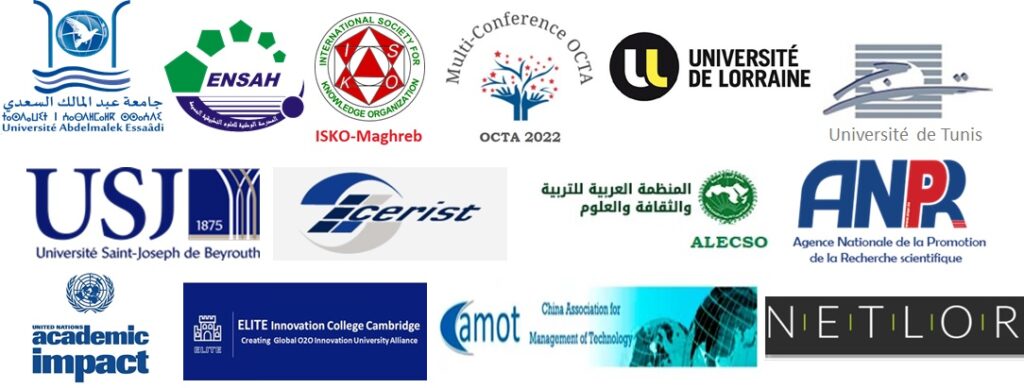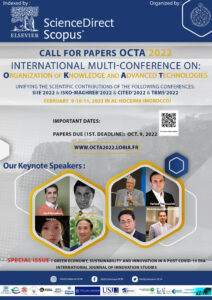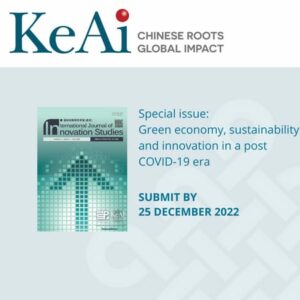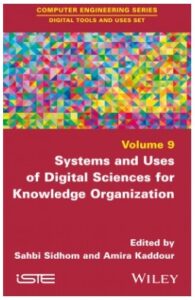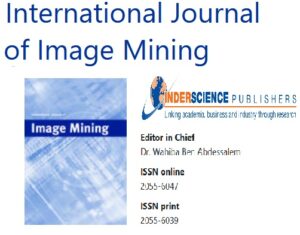SIIE ̓ 2022, 9th. Edition of the International Conference on:
Information Systems and Economic Intelligence.
Thematic Conferences & Tutoriels in OCTA’2022 Multi-Conference.
February 9-10-11, 2023 in Al-Hoceima (Morocco).
♦ General program of OCTA (Feb. 9-10-11, 2023) :
With the integration of the 5 scientific programs of OCTA’2022, SIIE’2022, ISKO-Maghreb’2022, CITED’2022 and TBMS’2022: Scientific Programme of OCTA 2023_v7 (FEB 7, 2023).
♦ Keynotes of OCTA (Feb. 9-10-11, 2023) :
- Day 1: Pr. Jean-Paul HATON (Université de Lorraine & IUF, France): “The Metaverse: The virtual world of tomorrow“.
- Day 2: Prs. Isabelle SAYN & Naceur CHAABANE (CNRS Paris, France): “Artificial Intelligence in the Humanities and Social Sciences“.
- Day 3: Pr. Jean-Charles Lamirel (University of Strasbourg, France & University of Technology of Dalian, China): “A step ahead for generation of explainable embeddings using feature maximization principle: Application to graph and word embeddings“. & Presentation (datashow).
♦ Important Dates :
| Papers due (last deadline): | DEC. 25, 2022 |
| Notification of acceptance (2nd. deadline): | DEC. 10-25, 2022 |
| Final paper & Camera-ready due: | DEC. 25, 2022 |
| Registration for authors (last deadline): | JAN. 5-15, 2023 |
| SIIE’2022 in OCTA days: | FEB. 9-10-11, 2023 |
| Best Paper Awards: | FEB. 11, 2023 |
♦ CFP, SPECIAL ISSUES :
♦ Description :
The SIIE conference aims to promote dialogue between experts and researchers from both the public and private sectors, on fundamental and experimental knowledge of Information Systems and Economic Intelligence (SIIE). This is to upgrade in a risk environment the technologies related to economic intelligence (IE). The dynamics of EI (ie. Competitive Intelligence) depend on mastering the knowledge and skills needed to design the best strategies and to ensure that decision-makers make the right decisions.
SIIE will hold its eighth (9th.) edition in Morocco in November 2022, after 8 successful editions. This edition is organized by the University of AL-HOCEIMA (ENSAH) and supported by the universities of the Maghreb countries, Europe and the sponsorship of the International Societies.
The last editions and its proceedings since Feb. 2020, have allowed academic researchers and economic actors to come up with finalized projects. The goal of SIIE is to continue in this way by creating opportunities, innovative ideas and means to strengthen projects, and to build bridges between universities and industries on both shores of the Mediterranean.
SIIE’2022 will offer lectures, tutorials, authors’ presentations and industrial panels that will be led by experts to identify new approaches and knowledge in economic intelligence, as well as applied research and feedback.
In a friendly and pleasant environment, as Tunisia knows how to do so, the SIIE conference promotes the creation of networks of trust between academics, industry and politicians, thus contributing to strengthening the alliances of the scientific community SIIE. The recommendations and opinions of the experts will help this community to find solutions to its many questions and problems.
♦♦ OCTA Organization:
SIIE’2022 event will be in the International Multiconference OCTA in Feb. 2023 and its projects, communities and scholarly societies (SIIE, ISKO-Maghreb, CITED and TBMS) in AL-Hoceima (Morocco). The organization is under the aegis of Abdelmalek Essaadi University & ENSAH (National School of Applied Sciences – Al-Hoceima) with its partners, and national & international sponsors.
♦ Topics: (are not limited to these main topics)
1- Information System (IS) for Strategy and Economic Intelligence (IE)
a. Information systems design
b. Warehouses, multidimensional databases and heterogeneous data mining
c. Information search and strategies adapted to the actor’s profile
2- Collaborative information research for watch process
a. Watch tools and new trends of IE tools
b. Analytical tools, strategic processes and economic intelligence systems
c. Collaborative work, collection and analysis of information
3- Language and knowledge industry for decision support
a. Heterogeneous or multilingual information, annotations, corpus analysis, and information design
b. Resource Mapping, Indexing and Knowledge Management
c. Big Data and Decision Support Processes
4- Economic Intelligence Methodologies for Organizations
a. Integrating EI into business: experiences and case studies
b. IE Concepts, Actions and Processes: Research and Applications
c. Key Success Factors for an EI System: Strategic Leadership
5- Cognitive and social dimensions in the Watch and IE processes
a. Multidimensional Approaches to the « Information Need » Concept
b. Cognitive and social dimensions of information practices
c. Appropriation of watch and IE tools
6- Management of information, knowledge and heritage protection
a. Collective Corporate Memory and Management of Operational Know-How
c. Informational, competitive and technological watch & Treatment of the infobésité
b. Adapted means of analysis and description: from text to multimedia
7- e-Intelligent Technologies for Information Systems
a. Man-Web intelligent interaction and referral systems
b. Semantic Engineering: Web-Mining, Web-Agents and Web-Services
d. Security, integrity and robustness of systems
8- Governance of Information Systems
a. Value Generation and Strategic Alignment
b. Resource Management, Risk Measurement and IS Performance
c. IS standards and methods
9- Methods, Systems and Applications of Community Interest
a. Enterprise Architectures and Applications: Finance, Economics and Management
b. Communication Networks: Social Networks and Leadership, e-Business and e-Reputation
c. Corporate governance: quality, safety, certification and performance
10. Economic Intelligence for Strategic Management
a. Economic intelligence and risk management
b. Economic Intelligence and Management & Knowledge Organization
c. Economic Intelligence and Innovation Management
♦ Programme Committee:
♦♦ Steering Committee:
Sahbi SIDHOM (LORIA – Université de Lorraine, France)
André FLORY (INSA – Université de Lyon, France)
Aris M. OUKSEL (University of Illinois at Chicago, USA)
Kamel SMAILI (LORIA – Université de Lorraine, France)
Jean-Paul HATON (INRIA – Université de Lorraine & IUF de France, France)
Marie-Christine ROUSSET (LIG – Université de Grenoble & IUF de France, France)
Nacer BOUDJLIDA (INRIA – Université de Lorraine, France)
Jonathan CALOF (Telfer School of Management – University of Ottawa, Canada)
Davy MONTICOLO (ENSGSI – Université de Lorraine, France)
Mohand-Tahar KECHADI, University College Dublin, Dublin (UCD): new member
♦♦ Scientific Gerneral Chairs:
Mohand-Tahar KECHADI, University College Dublin, Dublin (UCD)
Sahbi SIDHOM (LORIA – Université de Lorraine, France)
MEZIANE Abdelkrim (CERIST, Algeria)
♦♦ Members:
ABOU EL MAJD Badr (Hassan II University, Morocco)
AGOSTINELLI Serge (LSIS UMR CNRS 6168 – Université Paul Cezanne Aix-Marseille III, France)
AïMEUR Esma (University of Montreal, Canada)
ALIMI Adel M. (IEEE Computer Society Tunisia & ENIS – University of Sfax, Tunisia)
AMAMI Mokhtar (Business Administration – Royal Military College of Canada, Kingston. Ontario, Canada)
BADACHE Nadjib (Directeur du CERIST, Algeria)
Ben Abdessalem Wahiba (ISG – University of Tunis, Tunisia)
BEN AYED Mounir (Faculty of Sciences, University of Sfax, Tunisia)
BEN GHEZALA Henda (ENSI – Université de la Manouba , Tunisie)
BEN HAMADOU Abdelmajid (Lab. MIRACL Université de Sfax, Tunisie)
BENKARAACHE Taoufik (Hassan II University, Morocco)
BENSAOUD Othmane (IGA – Marrakech, Maroc)
BERRADA Ilham, ENSIAS, (Université Mohammed V de Rabat, Morocco)
BIDAN Marc (Université de Nantes, France)
CALOF Jonathan (Telfer School of Management – University of Ottawa, Canada)
CHAFIK Khalid (ENCGT, Morocco)
CHAUDIRON Stéphane (Université de Lille 3, France)
CHICHTI Jameleddine (Montpellier Business School, France & Tunisie)
CUNG Van-Dat (Grenoble-INP, France)
DOUSSET Bernard (IRIT – Université de Toulouse, France)
EL AKKAOUI Zineb (INPT, Morocco)
EL GHAZI Hamid, (INPT, Morocco)
EL HACHANI Mabrouka, (ELICO – Université Jean Moulin Lyon3, France)
EL HADDADI Anass (ENSA Al-Hoceima, Maroc & Université de Toulouse, France)
FAUVET Marie-Christine (LIG – Université Joseph Fourier, France)
FEKI Jamel (Lab. Miracl, Université de Sfax, Tunisie)
FOHR Dominique (INRIA Grand Est & Université de Lorraine, France)
GLADY Marc (ESSEC Business School, France)
GRESSER Jean-Yves (Black Forest Group Inc. New York, USA & GELM Entreprises. Paris, France)
GRIVEL Luc (Université de Paris I Panthéon-Sorbonne, France)
GUAAYBESS Tourya (CREM – Université de Lorraine, France)
GUY Pascal (Oracle Toulouse, France)
HASSANALY Parina (IEP d’Aix-en-Provence, France)
HASSOUN Mohamed (ENSSIB de Villeurbanne, France)
HATON Jean-Paul (LORIA/INRIA – Université de Lorraine et Institut Universitaire de France, France)
ILLINA Irina (INRIA Grand Est & Université de Lorraine, France)
JAMOUSSI Salma (Lab. Miracl, Université de Sfax, Tunisie)
KALLEL Ilhem (ISIMS, University of Sfax, Tunisia)
KAMMOUN Habib (ENIS, University of Sfax, Tunisia)
KASSOU Ismaïl (ENSIAS – Université Mohammed V Souissi de Rabat, Maroc)
KAZAR Okba (Département d’informatique – Université de Biskra, Algérie)
LAMBERT Philippe (Université de Lorraine, France)
LAURENT Anne (LIRMM – Université Montpellier 2, France)
LELEU-MERVIEL Sylvie (Université de Valenciennes et du Hainaut-Cambrésis, France)
LÓPEZ-HUERTAS María (Universidad de Granada, Spain)
MAKHLOUF Mohamed (KEDGE Business School, France)
MEZIANE Abdelkrim (CERIST, Algeria)
MILLE Alain (LIRIS – Université Claude Bernard Lyon1, France)
MIRANDA Serge (Faculté des Sciences, Université de Nice Sophia Antipolis, France)
MOINET Nicolas (IAE Université de Poitiers, France)
NOURRISSIER Patrick (Director NetLor Concept, France)
NOWAKOWSKI Samuel (LORIA – Université de Lorraine, France)
OHLY Peter (President ISKO int. & GESIS – Leibniz-Institut für Sozialwissenschaften – Bonn, Germany)
PECQUET Pascal (Université de Montpellier 1, France)
PINON Jean-Marie (INSA de Lyon, France)
RAZMERITA Liana (Copenhagen Buisness School, Denmark)
ROUDIES Ounsa, (Ecole Mohammadia d’Ingénieurs, Université Mohammed V de Rabat, Morocco)
ROUSSET Marie-Christine (LIG – Université de Grenoble & Institut Universitaire de France, France)
SALEH Imad (Lab. Paragraphe, Université Paris 8, France)
SMAILI Kamel (LORIA – Université de Lorraine, France)
SOUISSI Omar, (INPT, Morocco)
SOLBERG SØILEN Klaus (Blekinge Institute of Technology, Sweden)
TAKI Mounaim (Mohamed V University, Morocco)
TANTI Marc (Centre d’épidémiologie et de sante publique des armées – UMR 912 – SESSTIM, France)
TARDIEU Hubert (ATOS, France)
TARI Kamel (Univeristé de Bejaia, Algeria)
THELWALL Michael (School of Technology, University of Wolverhampton, UK.)
YILDIZ Ustun (University of California – Davis, USA)
ZREIK Khaldoun (CITU-Paragraphe & Université de Paris 8, France)
♦ Language & Communication in Symposium:
Presidents of SIIE ̓ 2022 encourage authors (senior, junior and professional) to submit proposals on a “LONG Abstract” in the recommended format (IEEE Template in 2 columns) in well written English or French. After reviews, the corrected and completed author’s proposal must be submitted in a final English full version.
– First, long “Abstract” proposals must be written in English or French.
– Second, final “Full” proposals must be written in English.
– All data-show presentations (in PowerPoint) must be written in English.
– Oral presentations and discussions are permitted in English and/or in French.
♦ Paper Guidelines: (proposals in detailed ABSTRACT or in full PAPER)
- Detailed abstract (Title, Abstract, Keywords and Short bibliography): in process of reviewing, you must select your « Title » that grabs attention with « Keywords », accurately describes the contents of your manuscript concisely by your « Abstract » with « Short bibliography », and makes people want to read further your « full text »: Prioritizing Communication Poster ;
or
- Full text proposal: in process of reviewing, authors should propose the full version paper: Prioritizing Oral Communication.
- Manuscripts must follow the Springer template guidelines, including figures, tables, and references. The paper must be prepared by using the template in MS Word or LaTeX as PDF files through EasyChair System below. The length of papers should not exceed 10 pages.
(LNNS is indexed in SCOPUS, INSPEC, WTI Frankfurt, zbMATH, SCImago, and submitted for consideration in Web of Science. Click here for more information.)
♦ Paper Rating:
- The Scientific Committee will assess the relevance of each proposal and will propose appropriate changes.
- The acceptance criteria are: originality of the contribution, importance to the community and impact on future scientific work, significance of results and quality of presentation.
- Anti-plagiarism Policy: As part of the anti-plagiarism policy followed by SIIE & OCTA multi-conference Int. Organization, the papers will be subject to anti-plagiarism software Compilatio (https://www.compilatio.net/).
♦ Submission Papers: On easychair platform for the Int. MultiConference OCTA ̓ 2022
- Submission link:
 https://easychair.org/conferences/?conf=octa2022
https://easychair.org/conferences/?conf=octa2022
- Manuscripts must follow the Springer template guidelines, including figures, tables, and references. The paper must be prepared by using the template in MS Word or LaTeX as PDF files through EasyChair System below. The length of papers should not exceed 10 pages.
(LNNS is indexed in SCOPUS, INSPEC, WTI Frankfurt, zbMATH, SCImago, and submitted for consideration in Web of Science. Click here for more information.)
♦ Registration Fees: (in progress)
♦ Conference Venue: (in progress) AL-HOCEIMA (Morocco).



